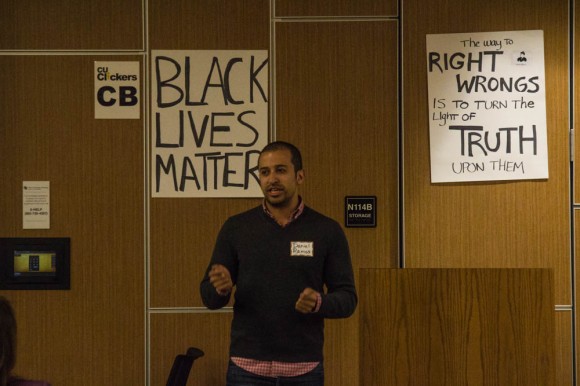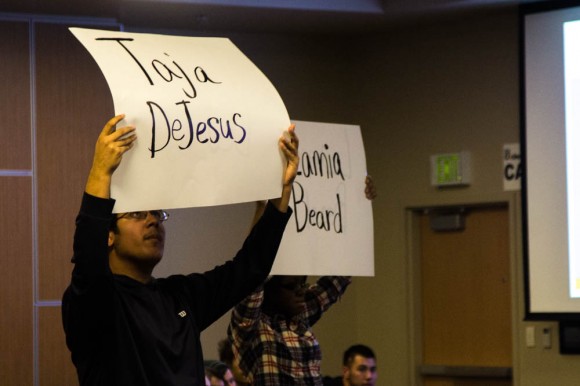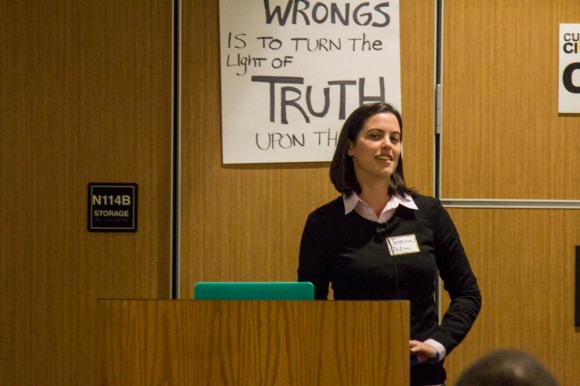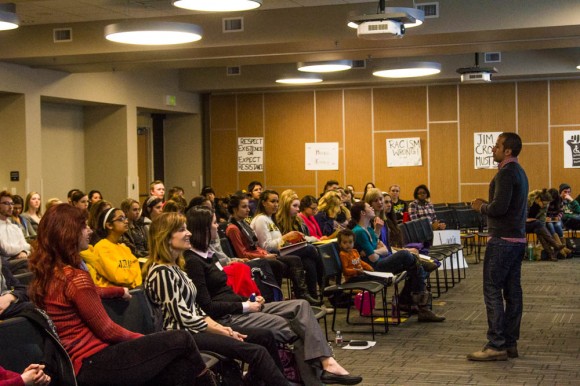
The Political and Organizing Director of One Colorado, Daniel Ramos, speaks on his journey to achieve LGBT equality during the “And Justice For All?” forum in Kittredge North on February 18, 2015. (Robert Hylton/CU Independent)
On Wednesday evening, the Communication and Society Residential Academic Programs held a public forum entitled, “And Justice for All?: Ongoing Struggle for Civil Rights in the U.S.” The speakers included Daniel Ramos, Michele Simpson, Jessica Polini and Diane DeBella, who each spoke about the area of civil rights they were most passionate about.
The speakers were accompanied by Karina Branson, a self-described “word and image blender,” who was there to weave the content of the speeches together with graphics to depict the core meaning of what was being said.
On the wall near Branson’s easel were handwritten signs that said things like “Black Lives Matter,” and, “The way to right wrongs is to turn the light of truth upon them.” Leading up to the show, there was a slideshow of civil rights events since the early 1900s.
The tone of the forum was solidified with a student performance of the Marvin Gaye song, “What’s Going On?” as a way to introduce the topic of equality and the unnecessary death that happens when equality is absent. The lyricism was relevant: “We’ve got to find a way to bring some lovin’ here today.”
The first speaker, Daniel Ramos, tackled gay rights. As the Political and Organizing Director for One Colorado, an advocacy organization that promotes equal legal treatment of LGBT individuals, Ramos works to influence Colorado public policy. He introduced himself as “professionally gay.”
His talk was called “The Journey for LGBT Equality in Colorado and Beyond,” and he spoke primarily about his experience of coming out, as well as the work that One Colorado does for the LGBT community.
Ramos did not grow up in an environment welcoming of his sexuality. His parents assumed that his coming-out was simply a phase and waited for it to pass. He came out around the time that Matthew Shepard was killed, and his political representative was Marilyn Musgrave, a Republican who was anti-gay marriage.
This environment was the impetus of Ramos’ movement to make change. He joined One Colorado to inspire people to bring issues pertaining to the LGBT community to the media, where they can tell their stories and bring the topics to the attention of the public.
As he’s worked on various issues in Colorado, he’s noticed a widespread ignorance of important issues—ignorance that he said leads to assumptions, about the LGBT community in particular.
“It’s not just LGBT students who are targeted for bullying,” Ramos said. “It’s students who are perceived to be LGBT.”
These assumptions are harmful, and further stigmatize an already sensitive issue, Ramos said, and he hopes to change that. He is part of a new initiative called “Run Today, Lead Tomorrow,” a student government program that hopes to give future leaders a well-rounded knowledge of important issues.
A particularly harmful bill is currently in the works that would allow for people to circumvent laws based on religious beliefs. When asked if it was going to pass, Ramos firmly stated, “We’re gonna kill it on Monday.”

Women and Gender Studies professor Dr. Michele Simpson had students in the audience hold up the names of several black transgender women who have been killed so far in 2015. (Robert Hylton/CU Independent)
Following Ramos was Michele Simpson, a professor at CU, who gave a talk entitled, “State of Emergency: Transgender Women of Color.” Simpson has a deep-seated background in civil rights.
“I was weaned on stories about the civil rights movement,” Simpson said. Her grandma was a driver during the Montgomery Bus Boycott. She said she was also deeply affected by the 1963 16th Street Baptist Church bombing in Birmingham, Alabama, which took the lives of four young girls whose names she says she’ll never forget.
“So often, individuals become footnotes,” she said.
This concept came full circle during the presentation when Simpson had students scattered throughout the audience hold up signs with the names of five different transgender women of color who were killed in 2015—Taja Dejesus, Lamia Beard, Penny Proud, Yazmin Payne and Ty Underwood. She urged the audience to remember their names.
Simpson emphasized the problems transgender women of color face in American society with hard-hitting statistics. Seventy percent of the victims of anti-LGBT homicides are transgender women and almost 90 percent of the LGBT homicide victims are people of color. Simpson said a member of the transgender community is murdered every three days somewhere in the world. The list went on.
To further ingrain the horror of these attacks in the minds of the audience, Simpson explained that many of these murders were stabbings, emphasizing how personal a stabbing is compared to shooting a gun.
“It speaks to a level of profound hatred and repulsion that we need to understand,” Simpson said.

Jessica Polini, Investigator at the Office of Institutional Equity and Compliance at the University of Colorado, speaking on the issues we have addressing sexual misconduct during the “And Justice For All?” forum in Kittredge North on February 18, 2015. (Robert Hylton/CU Independent)
Simpson was followed by Jessica Polini, who works for the Office of Institutional Equity and Compliance on campus. Polini spoke about “Addressing Sexual Misconduct on Campus.” Much of her job revolves around investigating complaints made about sexual misconduct as reported by students.
Polini’s office works to ensure that CU properly addresses sexual misconduct, and she emphasized that it applies to anyone, not just women.
“Our office is a neutral, fact-finding office,” Polini said.
The office has 60 days to complete an investigation, but can implement interim measures to ensure student safety during the investigation. The issues they handle include non-consensual sexual intercourse, non-consensual sexual contact, sexual exploitation and sexual harassment.
“Incapacitation is one we see a lot,” she said. “That’s gonna come in when drugs or alcohol are involved.”
Polini emphasized the goal of providing a safe environment where people can get an education on campus while her office finds all the facts.
At the end of her talk she joked, “I hope to never see any of you again.”
Finishing the string of speakers was Diana DeBella, a professor at CU and winner of the CU Women Make a Difference Award, who spoke about “The F Word: The History of Feminism in the U.S.”
DeBella began with a look at British Common Law, explaining that early years in the colonies were not particularly kind to women. Examining Abigail Adams and Elizabeth Cady Stanton, DeBella gave an overview of how the women’s rights movement evolved and progressed until the Seneca Falls Convention in 1848.
DeBella emphasized the relevance of the situation by showing how many improvements were made just over fifty years ago. Marital rape wasn’t criminalized until 1958, and birth control was allowed in 1966, but only for married couples. The Equal Rights Amendment was another point of contention, as it was not well received for years.
Turning to feminism today, DeBella said, “It’s almost as if you have to whisper the word feminist.”
The negative connotations that follow feminism around make it hard to sell as an idea to get on board with, she said, but that doesn’t mean there isn’t hope.
“Change can happen,” DeBella said. “I have 18-year-old twins. I worry because my daughter is growing up now to have fewer rights than I did. That’s not okay. You all need to change that.”
“I feel like a lot of people don’t identify with the groups being discriminated against. That makes it easier to look past. Inaction is easier than action,” Joe Rickard, a computer science major, said.
That seemed to be the general sentiment of the forum, as each speaker emphasized a call to action against the civil rights issues that have evolved and are still relevant today.
The forum was ended with a performance of the Sly and the Family Stone song “Everyday People,” bringing full circle the idea of equality and the importance of preserving it.
Contact CU Independent Staff Writer Maggie Wagner at magdalen.wagner@colorado.edu.

